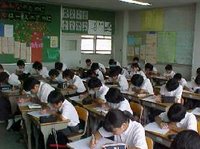
Hello. I'm Itsumi. Today, I want to introduce my experience of visiting Australia in a home stay program when I was 16. I had been to foreign countries several times, but it was the first time for me to stay with a family. It was full of new
 findings and surprises.
findings and surprises.The first thing I realized was that Australian people are very friendly. While I was in school, every student said hello to me and during recess, they willingly showed me around to the schoolyard. When I first met my host family, they welcomed me with a hug. I was surprised because in Japan, we seldom hug even with a family or close friend. Japanese bow instead of hugging or shaking hands when greeting each other. [Another surprising thing happened] one day, when I was in the bus, a girl sitting next to me spoke to me. Instead of noticing my poor English, she patiently listened to me and kept on talking until she got off the bus. We Japanese rarely talk to the strangers in the bus or train, so at first I was surprised but I was happy she talked to me. We use honorific expressions when we talk to senior person, but there are no honorifics in English. This may be one reason for making us feeling that English-speaking people friendly.
Also, Australian people are active compared to Japanese. One day at school, the teacher asked a question in the class. Then, almost every student actively raised their hands and gave their opinion (as Kano mentioned about her stay in Germany). In such a situation, Japanese students are passive. Few people raise their hands and other students are just waiting for the teacher to
 choose a student.
choose a student. Australian people say what they think or what they want clearly. For example, when I cooked Japanese food for host family, my host sister said that she doesn’t like the food. As for me, even when something I don’t like was served, I politely said “It’s tasty.” Japanese people often avoid mentioning our honest thoughts and feelings in order to keep harmony in our communities and societies as a whole. We say what we are supposed to say in any given situation. It is an important rule that is considered necessary to maintain smooth relationships between people in Japan. This stance, however, sometimes causes misunderstandings between Japanese and foreigners, who may find these attitudes dishonest.

There were many other cultural differences between Japan and Australia. For example, we take off our shoes when we enter a house, but they don’t. We eat rice everyday, but they rarely eat rice and their staple food is bread. Japanese bathrooms usually contain an area for washing the body and a separate bathtub, but in Australia, they have only bathtub, and they don’t fill the bath with water. Maybe these customs are not peculiar to Australia, but Western countries have the same customs, too.
I don’t think Australian culture is strange and nor is Japanese. Nothing is right and nothing is wrong. I like both Australian and Japanese nationality. Every culture has different aspects and I think we should proud of our own culture. Everyone is different, and that’s the fun of intercultural communication.
My stay was only three weeks, but I learned so many things. It was pity that I had to come back [so soon]. I only wished I could speak English better so that I could make myself understood. Though I was shocked and confused with the difference of culture many times, I really enjoyed my stay and had a wonderful time. This precious experience opened up new horizons for me.
[Editor's comment: It seems that this experience may have been one of the reasons for Itsumi having chosen this course. Because she appreciated her real opportunity to encounter intercultural communication and valued that chance in Australia, it made her often contribute to the class discussion. Her article here clearly demonstrates that she -- not only gained some important intercultural communication competencies - but her English did benefit even from the short stay in Australia. I think the real value is the increased level of confidence in being able to communicate successfully and meaningful with people from another cultures that makes stories like Itsumi's not only interesting but highly educational. db July 14, 2006]











